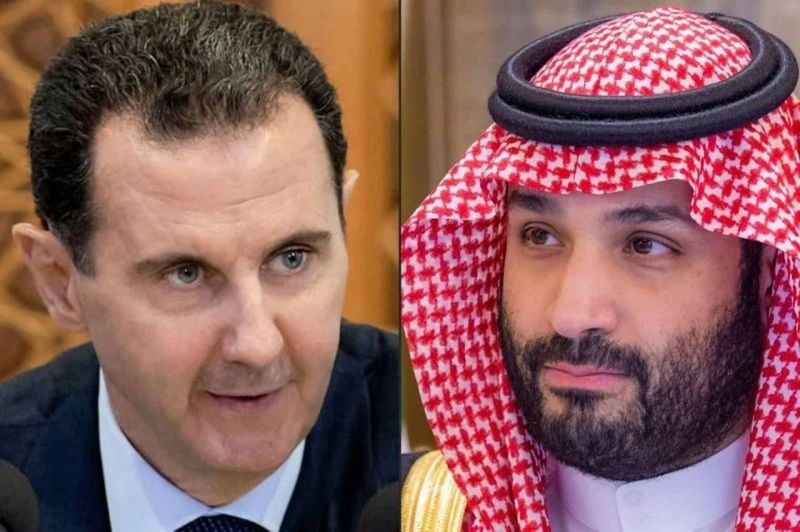
Syrian President Bashar al-Assad in Damascus and Saudi Crown Prince Mohammad bin Salman. (Credit: Bandar al-Jaloud/AFP)
“Why would our state have any interest in promoting Captagon trafficking?” said Syrian Bashar al-Assad during an interview aired on Sky News Arabia last Wednesday.
Analysts report that Syria controls 80 percent of regional production of this synthetic fenethylline-based stimulant, potentially yielding profits of up to $10 billion by 2022. This windfall is a lifeline for a state emerging from a decade of warfare and grappling with the constraints of Western sanctions.
The nexus between top-tier government figures and drug traffickers has been substantiated following a collaborative inquiry by BBC Arabic and the investigative journalism network OCCRP (The Organized Crime and Corruption Reporting Project).
By disregarding all evidence and denying the state’s involvement in this traffic, Assad is once again underscoring his reluctance to cooperate in eradicating this menace, which is wreaking havoc across the Middle East, especially in Saudi Arabia, the primary market.
It is precisely due to this stance that Riyadh, diligently striving to achieve the ambitious goals of Vision 2030, elevated this issue to a foremost condition for normalizing relations with Syria on May 9 — a breakthrough following over a decade of diplomatic estrangement.
This endeavor followed the détente accord inked between Saudi Arabia and Iran — a pivotal ally of Assad’s regime, on March 10 under the aegis of China.
This marked a new chapter, fostering a reduction in tensions between Riyadh and the Tehran-Damascus alliance. However, the outcomes have been minimal, with scarcely any discernible progress even three and five months after diplomatic ties were reestablished.
MBS pulls out all the stops
Mohammad bin Salman (MBS) had spared no effort in attempting to restore the image of Assad’s regime, accountable for a significant portion of the 300,000 civilian deaths in the Syrian war.
The crown prince and de facto ruler of the kingdom invited the Syrian leader to May 19’s Arab League summit in Jeddah, effectively rehabilitating his deeply scorned regime without extracting any concessions.
The following month, however, substantial quantities of amphetamine pills were uncovered in both Oman and Iraq.
Meetings have been scheduled approximately every three months to assess the progress of the normalization between Syria and Saudi Arabia.
The August meeting had to be postponed due to a lack of serious developments, particularly on the issue of drug trafficking.
“The Syrian regime has reached out to the Gulf states, particularly with an aim to negotiate the removal of sanctions imposed by the Europeans and Americans, but these efforts were to no avail,” said Ziad Majed, a Syria-focused political scientist.
“Consequently, the regime is resorting to leveraging Arab governments, highlighting their inability to persuade Western powers,” he added.
As Saudi Arabia’s rapprochement with the Iranian-Syrian alliance increasingly takes on the appearance of superficial stability, the kingdom has also come to terms with Iran’s presence in Syria, another pivotal precondition for the restoration of ties with Damascus.
“The Saudis are pragmatic,” Majed said. “They recognize that, despite their reconciliation with the Iranians and their incentivization of Bashar al-Assad by pledging financial support if he upholds his commitments regarding Captagon, containing Tehran’s influence in Syria is no longer feasible.”
Consequently, Majed said, the Saudi’s chief objective no longer centers on confronting Iran over this matter, but rather pivots toward mitigating tensions and focusing on the realization of their mega projects.
Lack of regional coordination
Riyadh’s other conditions, encompassing the secure repatriation of refugees and a diplomatic resolution to the conflict, appear to have been paused indefinitely.
In Saudi Arabia, Majed added, “there exists a notion that stability can ultimately yield prosperity without necessitating political transformation or a transition to democracy.”
By its essence the Syrian-Saudi rapprochement lends itself to this unproductive outcome, accompanied by a certain degree of disinterest.
“Simply suspending conflicts, rivalries, or affiliations that might escalate into tensions doesn’t truly equate to establishing a normalization that is both politically and economically consistent and genuinely cordial,” Majed added.
The normalization of relations with Saudi Arabia took place against a backdrop of many regional leaders wanting to re-engage with Assad, who had emerged as the victor of the war in a country in ruins.
Also badly hit by drug trafficking, Jordan drew up a roadmap to normalization with conditions similar to those of Riyadh.
As for Turkey, a meeting between President Recep Tayyip Erdogan and his Syrian counterpart — set to take place several months ago — was stymied by the thorny issue of Turkish troop deployment in north-eastern Syria. Assad has been calling for the Turks to withdraw.
The United Arab Emirates (UAE) was the first to reopen its embassy in Damascus in 2016.
“In light of the diverse array of regional endeavors aimed at re-establishing ties with Damascus, a window of opportunity has emerged for Syria,” said Alexander Langlois, an analyst at the Gulf International Forum. “The country seems to be deftly leveraging Turkish, Jordanian, and Emirati overtures to secure the most favorable concessions without reciprocating.”
He added, “The crux of the issue lies in the absence of coordination, as leaders across the region persist in projecting a fragmented stance, consequently fostering disparate approaches towards Assad.”
This dynamic is poised to bolster the Syrian leader’s standing for the foreseeable future, effectively exempting him from making any substantial concessions.
This story originally ran in French in L’Orient-Le Jour, translated by Sahar Ghossoub.